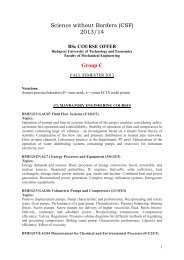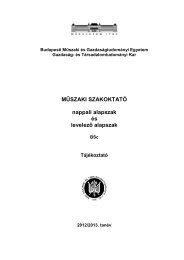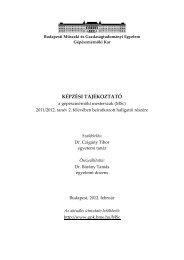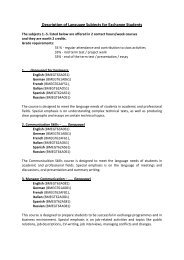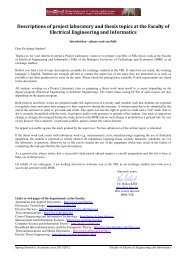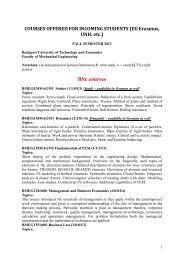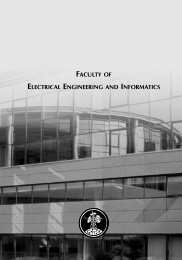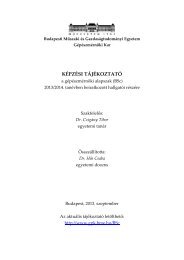FACULTY OF CHEMICAL TECHNOLOGY AND BIOTECHNOLOGY
FACULTY OF CHEMICAL TECHNOLOGY AND BIOTECHNOLOGY
FACULTY OF CHEMICAL TECHNOLOGY AND BIOTECHNOLOGY
You also want an ePaper? Increase the reach of your titles
YUMPU automatically turns print PDFs into web optimized ePapers that Google loves.
<strong>FACULTY</strong> <strong>OF</strong> <strong>CHEMICAL</strong> <strong>TECHNOLOGY</strong> <strong>AND</strong> BIO<strong>TECHNOLOGY</strong>Industrial Planning Practice IIBMEVESTA702Dr. Alajos GrünIntegrated application of basic, engineering, and economicstudies. Summarizes the practical process and equipmentdesign methodology; covers decision making and plant profitabilityevaluation. Student groups work on a departmentspecified practical industrial problem. They chose the necessaryequipment, plan their size, make flow-sheets and calculatethe time requirement of processes. During their work theyhave to adopt up to date requirements of the safety, GNP,environmental protection and green chemistry. Their reportsare validated by an industrial expert.Pharmaceutical technologyBMEVESTA704Dr. Zoltán HellThis subject gives an overview on the characteristic methodsfor the industrial synthesis of pharmalogically active substancesbased on known technologies of Hungarian and otherproducers. The relevant fields discussed are: choice of thesynthesis strategy, development and permanent updating ofthe industrial technology from different aspects such as theprotection of the environment, the assurance of the quality,the safety, the thrift and the protection of the copyright.Choice of the appropriate equipment, technologies for separationof pharmacologically active substances and their intermediatesfrom natural raw materials (plants, animals). Aspectsof the diminution of the waste materials produced, wastetreatment.Unit Processes in Industrial Drug SynthesisLaboratory PracticeBMEVESTA705Dr. Ferenc FaiglIn the framework of the practice typical industrial levelsynthetic technologies and processes are presented for thestudents. The theoretical background of the unit processesapplied in the presented technologies has been discussed inthe lectures of "Unit Processes in Drug Synthesis" and highlightedagain during the practices.Unit Processes in Industrial Drug SynthesisBMEVESTA606Dr. Ferenc FaiglThe subject deals with the typical chemical transformations,isomer separation techniques and scale up processes ofthe pharmaceutical and fine chemical industry. Among theunit processes the special N-, O- and C-alkylations, C-C bondforming reactions (Claisen-, Dieckman-, Knoevanagel- ésDarzens-condensation, Vilsmeyer-formylation, synthesis andreactions of polar organometallics), and selective reductionswith inorganic and organic hydrides are discussed. The theoryand methods for separation and enrichment optical isomers,as well as the rules of application dry technologies arediscussed and illustrated by industrial examples.Technology of Pharmaceutical MaterialsBMEVESTA607Dr. György MarosiThe aim of the lectures is to introduce the students into thetechnology of pharmaceutical products including the excipientsand drug delivery systems. The relevant structural andpharmaco-kinetical relationships, production, analytical andapplication methods are also covered. Completing the subjectthe students must be acquainted with the theoretical basisof pharmaceutical formulation and must have basic knowledgeabout all steps of production of pharmaceutical products.The themes of the subject are as follows:Basic terms of biomaterials and excipients, biologicaltransport mechanisms, toxicological aspects, in pharmaceuticaltechnology, classification of pharmaceutical products,incoherent, and coherent products, micro and macro capsulesfor controlling the drug release, analysis of qualitative,quantitative and structural analyses transdermal, ophtalmologicaland aerosol systems, aseptic production, packaging ofpharmaceuticals.Unit Processes of Organic ChemistryBMEVESTA508Dr. György KeglevichThe subject gives an overview on the most importantchemical transformations relevant to the pharmaceutical-,pesticide- and fine chemical industry. The following basicprocesses are discussed systematically: alkylation and acylationincluding the Friedel-Crafts reactions, halogenations, sulfonations,nitrations, diazotation and azo-coupling, oxidations,hydrogenations, CO-reactions and others. The stress islaid on the substrates, reagents, catalysts and optimum conditions,as well as on industrial examples and environmentalfriendsolutions.Branch of Material SciencePhysical Chemistry of SurfacesBMEVEFKA603Dr. Krisztina LászlóFundamentals of solid/fluid interfaces. The qualitativedescription of the surface layer, the concept of surface excess.Thermodynamics of the interfaces, surface tension and interactionpotential. Interactions at solid/gas and solid/liquidinterfaces. Adsorption isotherms, their interpretation (Langmuir,BET, Dubinin-Radushkevich and DFT models). Experimentalmethods, including calorimetry. Particle size analysis.Applied surface science: the role of interfaces in materialscience, environmental and industrial processes. Heterogenouscatalysis, Pressure/Temperature Swing AdsorptionFunctional and Intelligent MaterialsBMEVEFKA707Dr. Zoltán HórvölgyiThe scope of Functional and Smart Materials relates tomaterials, both synthetic and natural. On the basis of theirresponse to different stimuli, major distinction will be madebetween the structural- and functional materials. Specialemphasis will be devoted to the structure and properties ofbiomaterials. The basic properties of the synthetic functional-, multifunctional and smart materials will also be discussed,including electrostrictive-, magnetostrictive-, piezoelectrichard materials, as well as electrorheological- and magnetorheologicalliquids, responsive gels, and special polymersfor biomedical and pharmaceutical applicationsChemistry and Technology of MacromoleculesBMEVEMGA504Dr. Emilia CsiszárTypes of polyreactions: polymerization, polycondensation,polyaddition and other new polymerization reactions.Classification of chain polymerization reactions: radical,anionic, cationic and stereospecific polymerization. Theoryof free radical polymerization. Elementary reactions of radicalpolymerization. Types of initiators and the characteristics oftheir decomposition kinetics. Mechanism of chain propaga-73



